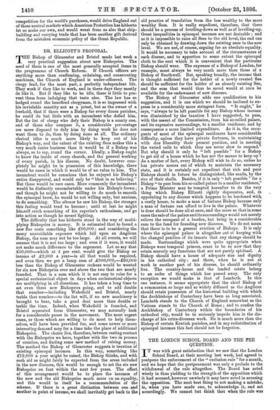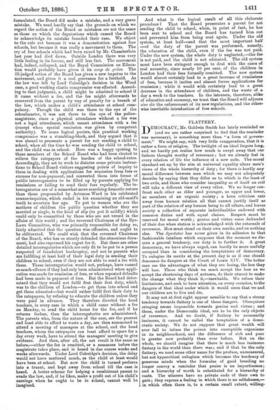THE LONDON SCHOOL BOARD AND THE FEE QUESTION.
IT was with great satisfaction that we saw that the London School Board, at their meeting last week, had agreed to postpone the enforcement of the " exclusion rule " for a month, and we hope that the postponement was only a prelude to the withdrawal of the rule altogether. The Board has acted wisely in thus yielding to the strength of the opposition which it had aroused, however unwisely it may have acted in arousing the opposition. The next best thing to not making a mistake, is, when you have made one, to acknowledge it, and act accordingly. We cannot but think that when the rule was formulated, the Board did make a mistake, and a very grave mistake. We need hardly say that the grounds on which we regard the action of the Board as mistaken are not the same as those on which the deputations which caused the Board to acknowledge its mistake founded their case. We object to the rule not because it was a demonstration against free schools, but because it was really a movement to them. The cry of free schools which had been raised by Mr. Chamberlain last year had died down. Outside London there was very little feeling in its favour, and still less fact. The movement had, indeed, collapsed, and the Royal Commission on Educa- tion would probably have given it its coup de grace. The ill-judged action of the Board has given a new impetus to the movement, and given it a real grievance for a foothold. As the law was left by Lord Coleridge's decision in the Wood case, a good working elastic compromise was effected. Accord- ing to that judgment, a child might be admitted to school if it came without a fee, and the fee might afterwards be recovered from the parent by way of penalty for a breach of the law, which makes a child's attendance at school com- pulsory. Though the child was there to the eye of the schoolmaster, it was not there to the eye of the police- magistrate, since a physical attendance without a fee was not a legal attendance, which meant attendance with a fee (except when special remission was given by competent authority). To some logical purists, this practical working compromise was a stumbling-block, and they argued that it was absurd to prosecute a parent for not sending a child to school, when all the time he was sending the child to school, and the child was in school. Here was a happy opening to those members of the School Board who had been elected to relieve the ratepayers of the burden of the school-rates. Accordingly, they set to work to disinter some private instruc- tions to School Board visitors suggesting points of inquiry to them in dealing with applications for remission from fees or excuses for non-payment, and converted them into forms of public interrogatories to be filled up by parents applying for remissions or failing to send their fees regularly. The in- terrogatories are of a somewhat more searching domestic nature than those propounded by Artemus Ward in his celebrated census-inquiries, which ended in his examining an old-maid's teeth to ascertain her age. To put to women who are the mothers of children the public question whether they are married or single, is the kind of slip (to put it mildly) which could only be committed by those who are not versed in the affairs of this world ; and the reverend Chairman of the Bye- Laws Committee, who was primarily responsible for doing so, fairly admitted that the question was offensive, and ought to be obliterated. We could wish that the reverend Chairman of the Board, who has so stoutly defended the obnoxious docu- ment, had also expressed his regret for it. But there are other detailed interrogatories which are only fit to be put to a person suspected of fraudulent bankruptcy, and not to parents who are fulfilling at least half of their legal duty in sending their children to school, even if they are not able to send a fee with them. These interrogatories would not, perhaps, have caused so much offence if they had only been administered when appli- cation was made for remission of fees, or when repeated defaults had been made in payment of fees. But the Board had deter- mined that they would not fulfil first their first duty, which was to the children of London—to get them into school and get them educated—but would rather fulfil first their duty to the ratepayers, by refusing to educate the children unless they were paid in advance. They therefore directed the head teachers, in every case in which a child came without a fee on Monday, to send the child home for the fee, and if he returns feeless, then the interrogatories are administered. The parents who, from the nature of the case, are the poorest and least able to afford to waste a day, are then summoned to attend a meeting of managers at the school, and the head teachers, whom the ratepayers can least afford to spare for a day every week, have to attend the managers' meeting to give evidence. And then, after all, the net result is the same as before,—either the fee is remitted, or a summons before the magistrate takes place, and is heard in due course weeks and weeks afterwards. Under Lord Coleridge's decision, the delay would not have mattered much, as the child at least would have been at school. But now the child is turned perforce into a truant, and kept away from. school till the case is heard. A better scheme for helping a recalcitrant parent to evade the law, and, if he likes, make a profit out of his child's earnings when he ought to be in school, cannot well be imagined. And what is the logical result of all this elaborate procedure I That the Board prosecutes a parent for not sending the child to school, when, in point of fact, he has been sent' to school and the Board has turned him out and prevented him from being seat again. Under the old' system, at least half—and that the most important half —of the duty of the parent was performed, namely, the education of the child, even if the fee was not paid. Under the new system, the whole duty is neglected,—the fee is not paid, and the child is not educated. The old system must have been stringent enough to deal with the cases of real necessity, since nearly 10 per cent. of the children in London had their fees formally remitted. The new system would almost certainly lead to a great increase of remissions of fees, because it incites and almost forces applications for remission ; while it would with certainty lead to a great decrease in the attendance of children, and the waste of a day a week to the teachers. In the interests, therefore, alike of education and economy, we trust that the Board will adjourn sine die the enforcement of its new regulations, and the other- wise inevitable introduction of free schools.



































 Previous page
Previous page